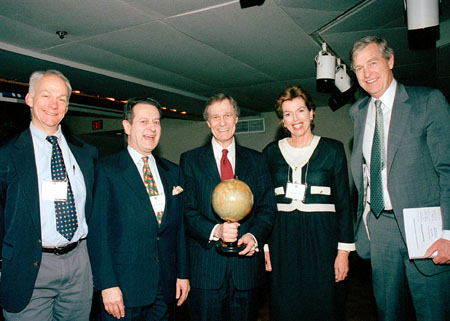Rudenstine honored by HUCE

On Wednesday, May 9, the Harvard University Center for the Environment (HUCE) honored President Neil L. Rudenstine for his contributions to the field of environmental studies at Harvard. The event was hosted by Michael B. McElroy, director of HUCE and Gilbert Butler Professor of Environmental Studies, Timothy E. Wirth ’61, Ed.M. ’65, chair of the HUCE Advisory Board, and executive committee members.
In 1991, Rudenstine announced the formation of an interfaculty initiative on the environment – the University Committee on Environment (UCE) – at Harvard. The mission of the committee (comprising 50 faculty members representing eight Faculties) was to unite the entire University behind the common goals of advancing knowledge about the environment and contributing to the solution of complex environmental problems. In April 2001, Provost Harvey V. Fineberg announced a permanent commitment to the committee’s educational and research programs with the establishment of the Harvard University Center for the Environment.
The center supports a highly successful undergraduate concentration in environmental science and public policy; interdisciplinary research ventures such as the China Project (a University-wide, multidisciplinary research program on energy use and environmental protection in the People’s Republic of China) and the Global Environmental Assessment Project, which seeks to promote a better understanding of the relationships among science, assessment, policy development, and management. The center also supports an Environmental Information Center that provides users inside and outside the University with access to comprehensive reference materials, and a series of lectures and seminars given by distinguished practitioners of environmental science and public policy.
McElroy acknowledged Rudenstine’s crucial role in helping to create UCE. “My first conversation with Neil about environmental issues took place before he had even officially begun his presidential duties,” he said. “He showed an immediate openness to ideas and suggestions from all sides. I’m very grateful for Neil’s visionary approach in setting up the committee and asking me to chair it in the first place, and for supporting it during the past 10 years at a level at which it can now make this vital transition from a committee to a center. I am also indebted to Provost Harvey Fineberg, who has consistently promoted the wise imperative that Harvard should approach complex problems like environmental degradation with its full complexity of intellectual resources.”
“There are all kinds of pressures out there not to create a concentration like environmental science and public policy, but with Neil’s help, it happened at Harvard,” added Wirth, who is president of the United Nations Foundation and a former U.S. senator and representative from Colorado. “Neil, along with the faculty and alumni advisory board, contributed to the program tremendous personal dedication and backing. In a short time, it has grown to more than a hundred student concentrators. They form part of a new generation of Harvard students who are preparing to go out and change the world, and that, I believe, is a legacy of which Neil can be most proud.”
Wirth presented Rudenstine with an antique globe on behalf of the advisory board as an expression of their appreciation.
“I am glad to have played a modest role in creating UCE,” said Rudenstine, “because I believe that a strong program in environmental studies is exceptionally important to Harvard, and will continue to be very important long after I am gone. Let me also say that I am especially grateful to Provost Harvey Fineberg for his oversight of the program. And of course Michael McElroy, Bill Clark, and the faculty have been critical to all the success to date. Tim Wirth and the advisory board have been steady, keen supporters. Finally, it has been the students, through their interest, energy, and superb academic work, who have made the program the impressive initiative that it is. They will ensure that environmental studies have a long and fruitful place at Harvard.”




